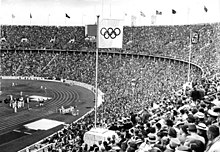
Back Берлин 1936 Abkhazian Olimpiese Somerspele 1936 Afrikaans Chuegos Olimpicos de Berlín 1936 AN الألعاب الأولمبية الصيفية 1936 Arabic اوليمبياد صيف 1936 ARZ Xuegos Olímpicos de Berlín 1936 AST 1936 Yay Olimpiya Oyunları Azerbaijani Olimpiade Masan Panes 1936 BAN Летнія Алімпійскія гульні 1936 Byelorussian Летнія Алімпійскія гульні 1936 году BE-X-OLD
| Host city | Berlin, Germany | ||
|---|---|---|---|
| Motto | I Call the Youth of the World!(German: Ich rufe die Jugend der Welt!) | ||
| Nations | 49 | ||
| Athletes | 3,963 (3,632 men, 331 women) | ||
| Events | 129 in 19 sports (25 disciplines) | ||
| Opening | 1 August 1936 | ||
| Closing | 16 August 1936 | ||
| Opened by | |||
| Cauldron | |||
| Stadium | Olympiastadion | ||
| Summer | |||
| |||
| Winter | |||
| |||

The 1936 Summer Olympics (German: Olympische Sommerspiele 1936) was a sporting event. They were officially called as the Games of the XI Olympiad. They were branded as Berlin 1936. The Olympics were from 1 to 16 August 1936. They took place in Berlin, Nazi Germany.[2]
The 1932 Los Angeles games were very successful. Nazi Germany wanted to have a more successful Olympic Games than in 1932. Reichsführer Adolf Hitler built a new track and field stadium. The stadium had seats for 100,000. Hitler also built 6 gymnasiums. They also built other, smaller arenas. The Games were the first to be on TV. There were radio broadcasts to 41 different countries.[3] Leni Riefenstahl was paid by the German Olympic Committee to show the Games for $7 million.[3] She made a movie about the Olympics. This movie was called Olympia. It was important in techniques seen in making sports videos now.
Hitler used the 1936 Games to promote the Nazi government, racial supremacy, and antisemitism. The Nazi Party newspaper said that Jewish people should not allowed to be in the Olympic games.[4][5] German Jewish people were not allowed to be athletes in the games.[6] However, some Jewish female swimmers from the Hakoah Vienna sports club were in the games. Some Jewish athletes from other countries were not allowed to compete, either. This is because their countries did not want to offend the Nazis.[7] Lithuania was not allowed to be in the Olympics because they were very anti-Nazi.[8]
The games were thought to be successful. The costs of the games was mostly paid for by the German government.[9] The Germans earned 7.5 million Reichsmark from the tickets. (€16.1 million in 2017). This gave the Nazis a profit of over one million R.M.
During World War II, there were no Olympics for 12 years. The next Olympic Games were in 1948 in St. Moritz, Switzerland. The next Summer Games were in London, England.
- ↑ 1.0 1.1 "Factsheet – Opening Ceremony of the Games of the Olympiad" (PDF) (Press release). International Olympic Committee. 13 September 2013. Archived (PDF) from the original on 14 August 2016. Retrieved 22 December 2018.
- ↑ Sports Reference.com (SR/Olympics), "1936 Berlin Summer Games" Archived 2008-07-07 at the Wayback Machine; retrieved 2012-7-24.
- ↑ 3.0 3.1 Rader, Benjamin G. "American Sports: From the Age of Folk Games to the Age of Televised Sports", 5th ed.
- ↑ Nagorski, Andrew. Hitlerland: American Eyewitnesses to the Nazi Rise to Power. New York: Simon and Schuster, 2012, p. 188.
- ↑ David Clay Large, Nazi Games: The Olympics of 1936, p. 58.
- ↑ "The Nazi Olympics Berlin 1936". Ushmm.org. United States Holocaust Memorial Museum. Retrieved 7 October 2016.
- ↑ "Jewish Athletes – Marty Glickman & Sam Stoller". Ushmm.org. United States Holocaust Memorial Museum. Retrieved 7 October 2016.
A controversial move at the Games was the benching of two American Jewish runners, Marty Glickman and Sam Stoller. Both had trained for the 4x100-meter relay, but on the day before the event, they were replaced by Jesse Owens and Ralph Metcalfe, the team's two fastest sprinters. Various reasons were given for the change. The coaches claimed they needed their fastest runners to win the race. Glickman has said that Coach Dean Cromwell and Avery Brundage were motivated by antisemitism and the desire to spare the Führer the embarrassing sight of two American Jews on the winning podium. Stoller did not believe antisemitism was involved, but the 21-year-old described the incident in his diary as the "most humiliating episode" in his life.
- ↑ "Trial of Neumann and Sass" (PDF).
- ↑ Zarnowski, C. Frank. "A Look at Olympic Costs," Archived 2018-12-25 at the Wayback Machine Citius, Altius, Fortius (US). Summer 1992, Vol. 1, Issue 1, pp. 21-22 [6-7 of 17 PDF]; retrieved 2012-7-24.